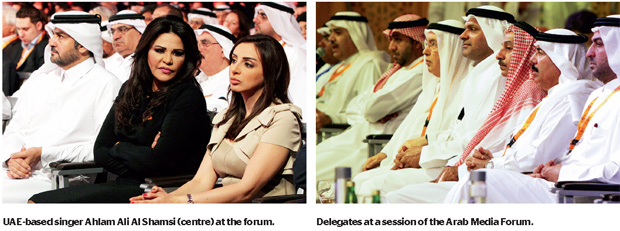
Dubai, May 15: Arab media is far from objective and is being torn apart by vested interests. It must be freed from corruption, nepotism and political, commercial and vested interests.
It must play a neutral and fair role in reforming the Arab world and its societies in transition, media experts said at the 12th Arab Media Forum that commenced on Tuesday. One expert even went to the extent of saying that Arab media has gone comatose and lacks feeling for the plight of the common man and woman.
They called for a new media landscape that will be based on objective journalism, helps the Arab societies in transition and contributes to the political and social reforms.
The recent political and social shift in a number of countries across the Arab world has led to a significant change in the Arab media landscape. Apart from the emergence of new media, the audience in most parts of the region has also migrated from following biased and restricted local media channels to seemingly more liberal and professionally managed platforms – both conventional and new.
“The Arab media is in a coma,” declared Dr Khalid Al Firm, professor of political media at Imam Mohammed bin Saud Islamic University in Saudi Arabia. “Rampant corruption, political controls and commercial interests coupled with the emergence of the social media is taking their toll on the Arab media.
“Lies are no longer marketable. There is a need for a new Arab media landscape that will be based on objective journalism and support the rebuilding of the Arab societies and reforms.”
He said due to these, majority of the traditional newspapers in the Arab world, such as Al Ahram of Egypt, are losing readership whereas the number of Tweeters and YouTube viewers are going up fast.
“Due to the traditional media’s role in supporting political establishments in the Arab Spring countries, we have seen the social media taking a hero’s role in the society as the audience no longer could trust the traditional media outlets. We are now witnessing a disconnect between the government and the people as well as the media,” he said.
However, the effect of changes in the media platform and the perception of stakeholders remain open to debate. For instance, a few events have revealed that under the guise of guidelines and ethics, owners of select media establishments are using their respective platforms as propaganda tools to serve their blinkered agenda.
“Furthermore, in the context of traditional media, internal controls have become tougher leading to the imbalanced performance of media outlets. Adding to this scenario is the bewildering proliferation of new media channels such as satellite TV and home grown websites, many of which are funded by governments, political authorities or powerful businessmen.
Hamlinha Baraasi, writer and media personality from Libya, said her country’s media scene is very chaotic. “Although the global media played a great role in reflecting on the revolution in Libya, the present day scenario is very chaotic – as far as the media landscape is concerned,” she said.
“There are about 20 odd television channels that are being run by untrained professionals and they show everything and anything – confusing the audience.
“We do not have any media law, regulations and there is no accountability. I’m afraid, the new freedom has changed into chaos. We have practically moved from one chaos to another.”
Rakan Al Majali, former Minister of State for Media Affairs and Communications, Jordan, said: “The Arab media is in a state of explosion. We need to rebuild our mind set. Arab media should be frank and honest with itself. The influx of the modern telecommunication technology and its exposure to the young generation is making them more confused. As a result, the Arab media is in a state of confusion.”
“There is a fear that the Arab world is losing its identity. The media could correct and help the Arab societies to regain their identity.”
In the absence of independent monitoring organisations, the Arab media does not have a way to monitor its performance or progress. Tracking the performance of the media and protecting the interests of the public is emerging as a critical challenge.
“It is becoming increasingly clear that the action taken by a few countries to revamp the media scene has been hasty and incomplete. Against this scenario, the call to expedite the development of radical and comprehensive media outlets is growing louder.
“We have recently established a higher committee to reform the media sector in Tunisia,” Kamel Labidi, president of National Commission to Reform Information and Communication (INRIC), Tunisia, said. “However, the political will to reform the media is not there. “We have drafted a lot of new laws to improve the journalism practice, but could not implement them, simply due to lack of political will.”
Despite the gloomy picture, the Arab media landscape has also got some good achievements. It has transformed well with the changing global media landscape. The Arab Spring has been a game-changer for the region’s media development which has been going through a major shift.
Yasser Abd El Aziz, consultant and media expert from Egypt said: “We have a lot of achievements and should not undermine the Arab media. However, we should seek stronger regulation and ways to strengthen the media in helping support the social and political reforms.
“However, the media should also maintain equal distance from politics, industries and the market to keep itself objective and focused.
Al Majali said, the Arab media should balance its relationship with politics, government and the commercial world.






Comments
Add new comment